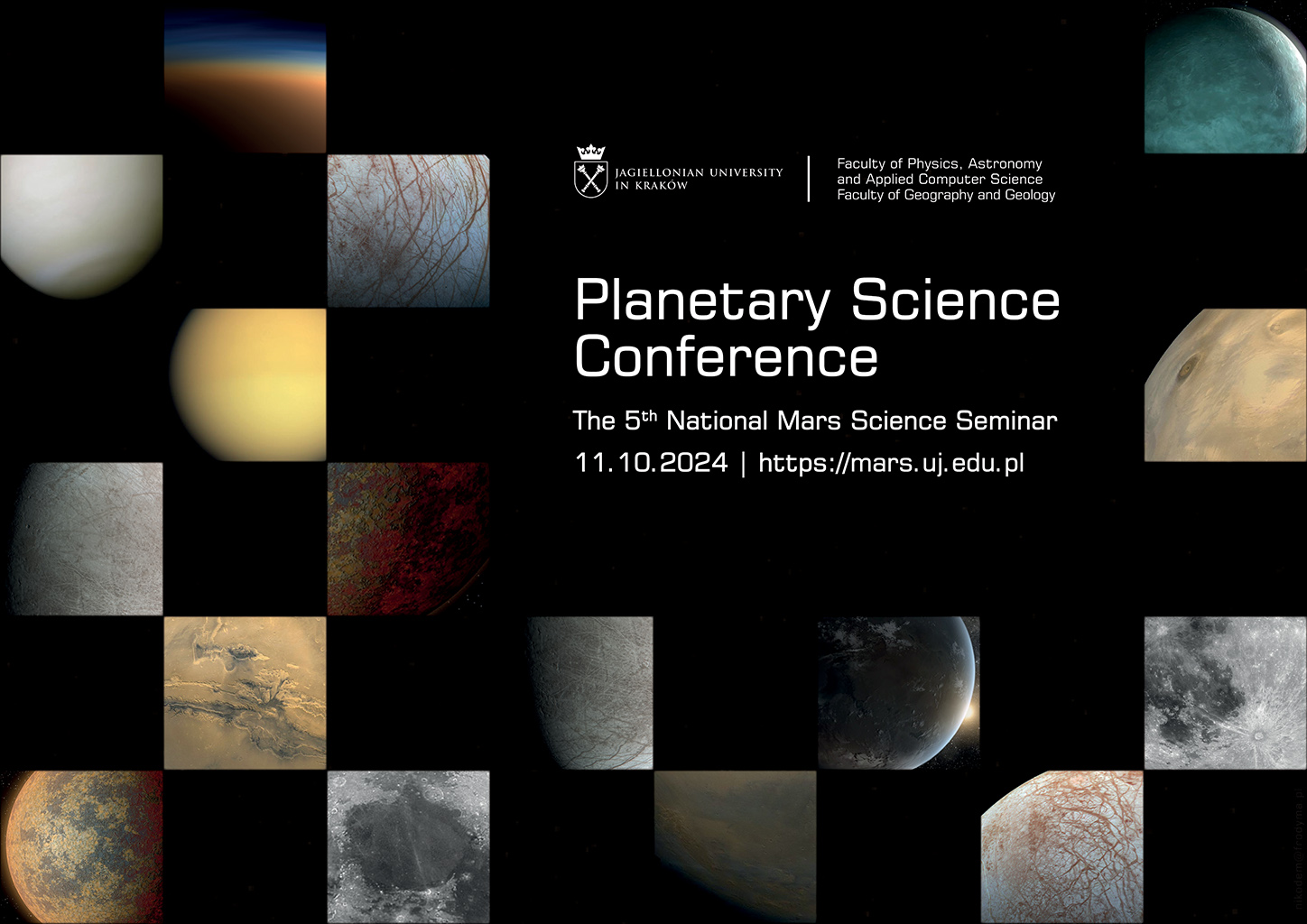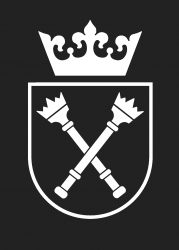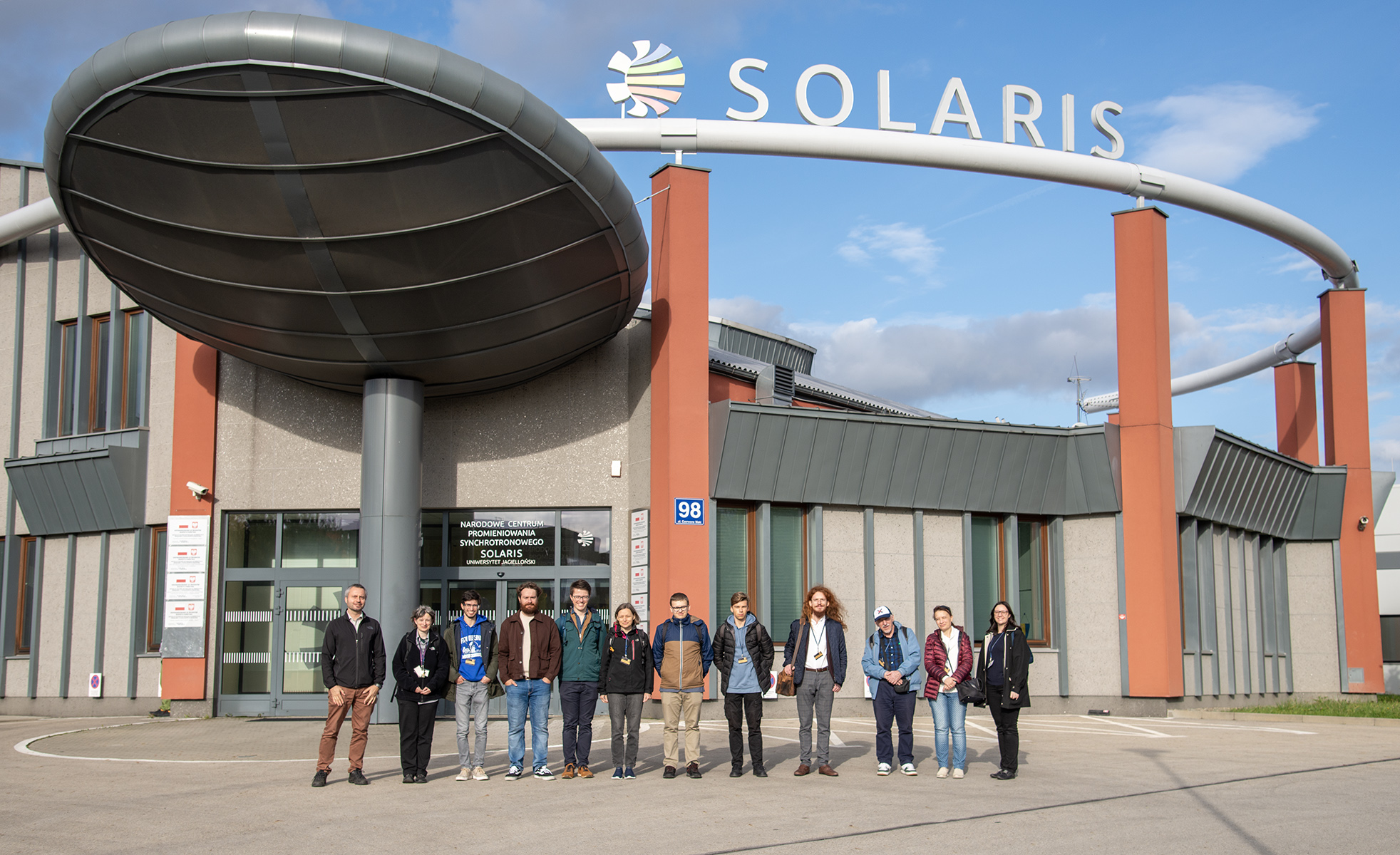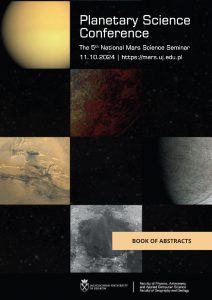
Aim and scope of the conference is to:
- Present achievements of Polish scientists
- Integrate the Polish community of planetary scientists
- Develop planetary and space science in Poland
- Strengthen international cooperation in planetary science
Topics of interest for submission include, but are not limited to:
- Planets (apart from Earth), moons, small objects of the Solar System
- Exoplanets
- Research associated to:
-
- Current and past missions
- New methods and tools for future space exploration
- Laboratory and theoretical simulations and studies of terrestrial analogs
-
Program:
9:30-10:00 Registration (Main Hall)
10:00-12:30 Talks (Room A-1-03)
-
10:00-10:05 Opening of the Fifth National Mars Science Seminar, Planetary Science Conference
-
10:05-10:20 Paweł Czernic (Warsaw University of Technology)
Swarm of drone-assisted Leo-rovers as an alternative to scientific exploration of Mars -
10:20-10:35 Joanna Gurgurewicz (Space Research Centre PAS)
Advancing lunar exploration through agile reconnaissance with hopter Galago -
10:35-10:50 Sam Poppe (Space Research Centre PAS)
Modelling magma-induced crustal deformation on the Moon, Mars, and Earth -
10:50-11:05 Pierre-Antione Tesson (Space Research Centre PAS)
AROMAS: A semi-automatic workflow to study hundreds of lava flows on planetary surfaces
11:05-11:20 Break
-
11:20-11:35 Claudio Orlanducci (Space Research Centre PAS)
Is the Origin of Martian Magnetic Anomalies Linked to a Giant Impact? -
11:35-11:50 Joanna Kozakiewicz (Jagiellonian University in Krakow)
Seasonal Activity of Aeolian Landforms on Mars -
11:50-12:05 Paulina Wolkenberg (Istituto di Astrofisica e Planetologia Spaziali – Istituto Nazionale di Astrofisica)
Topographic influence on atmospheric aerosols, temperatures and circulation over Tharsis on Mars -
12:05-12:20 Daniel Mège (Space Research Centre PAS)
A comprehensive emplacement scheme for the interior layered deposits of Valles Marineris
12:30-13:00 Posters (corridor in segment A, 2nd floor)
-
Franciszek Wrona (Jagiellonian University in Krakow)
The various definitions of ‘planet’ -
Szymon Mol (Jagiellonian University in Krakow)
Elevation and impact craters in the vicinity of Opportunity rover traverse -
Natalia Zalewska (Space Research Centre PAS)
Mineralogy of the Meridiani Planum site based on the MiniTES spectra of the Opportunity rover -
Leszek Czechowski (Space Research Centre PAS)
Origin of faculae on the dwarf planet Ceres
13:00-13:45 Lunch (Main Hall)
13:45-15:45 Synchrotron SOLARIS (trip starting point tbd)
15:45-17:00 Workshop (Room F-1-04)
Organizers
Honorary Committee
Prof. dr hab. Zbigniew Postawa
the Dean of the Faculty of Physics, Astronomy and Applied Computer Science
Prof. dr hab. Marek Drewnik
the Dean of the Faculty of Geography and Geology
Scientific Committee
- Dr hab. Joanna Gurgurewicz, prof. CBK PAN (Space Research Centre, PAS)
- Dr Joanna Kozakiewicz (Faculty of Physics, Astronomy and Applied Computer Science, Jagiellonian University)
- Prof. dr hab. Kazimierz Krzemień (Faculty of Geography and Geology, Jagiellonian University)
- Dr hab. Daniel Mège, prof. CBK PAN (Space Research Centre, PAS)
- Dr hab. Robert Olszewski, prof. PW (Faculty of Geodesy and Cartography, Warsaw University of Technology)
- Dr hab. Marian Soida, prof. UJ (Faculty of Physics, Astronomy and Applied Computer Science, Jagiellonian University)
Organizing Committee
-
Dr Joanna Kozakiewicz (Faculty of Physics, Astronomy and Applied Computer Science, Jagiellonian University)
-
Mgr Nikodem Frodyma (Faculty of Physics, Astronomy and Applied Computer Science, Jagiellonian University)
-
Dr Maciej Kania (Faculty of Geography and Geology, Jagiellonian University)
-
Dr Mateusz Sobucki (Faculty of Geography and Geology, Jagiellonian University)
-
Dr Mateusz Szczęch (Faculty of Geography and Geology, Jagiellonian University)
Contact
Faculty of Physics, Astronomy and Applied Computer Science
Jagiellonian University in Kraków
ul. Łojasiewicza 11, 30-348 Kraków
e-mail: mars@uj.edu.pl



